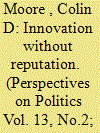| Srl | Item |
| 1 |
ID:
140202


|
|
|
|
|
| Summary/Abstract |
The Veterans Health Administration (VA) is among the most unusual and misunderstood institutions in the American welfare state. Unlike most American social services, veterans’ medical care continues to be administered directly by the state, contrary to the “antibureaucratic strategy” of “hidden” or “submerged” state-building that has dominated US social policy for decades. Drawing on extensive archival research, I attempt to make sense of the VA’s unique policy trajectory by exploring two puzzling episodes of institutional change in the delivery of veterans’ health care. Although many bureaucratic models predict large new undertakings initiated by agencies only when they benefit from the advantages of being well-regarded and relatively autonomous, both instances of institutional change occurred at the nadir of the VA’s reputation as a competent, innovative, and politically-powerful agency. To explain these unexpected transformations, I investigate the role of bureaucrats in shaping the development of the American welfare state and develop the concept of collaborative state-building to demonstrate how public-private partnerships may contribute to the expansion of social welfare programs in liberal states. Although public-private partnerships are usually seen as an erosion of state power or a way to hide the state’s role in the provision of social services, the case of the VA suggests that such partnerships may be used to support and expand such programs. I also focus on the VA’s many scandals and show how agency officials used these policy failures to expand the VA.
|
|
|
|
|
|
|
|
|
|
|
|
|
|
|
|
| 2 |
ID:
190517


|
|
|
|
|
| Summary/Abstract |
This paper analyzes the effect of hybrid warfare factors on the operations of the RF AF medical service, identifies the extent of their influence on providing medical support, and formulates activity lines, considering the threats of new-type warfare.
|
|
|
|
|
|
|
|
|
|
|
|
|
|
|
|
| 3 |
ID:
175498


|
|
|
|
|
| Summary/Abstract |
The Botswana national security complex is fashioned around traditional (military) threats to security. This is demonstrated through the National Security Act and also by the country’s defense expenditure as a component of its GDP. Defense expenditure routinely takes the second largest share of GDP in Botswana. The outbreak of the novel Severe Acute Respiratory Distress Syndrome Corona Virus 2 (SARS-COV-2) or COVID-19, however, suggests a relook at Botswana’s national security towards none traditional security threats- in this case pandemics. The case for this is made clear by the evidently poor readiness to deal with possible mass infections both from a health budgetary perspective, and the availability of medical personal and equipment. This paper argues for securitisation of health care in Botswana- especially in light of the COVID-19 pandemic. This is possible through diversion of a portion current defense spending towards health care.
|
|
|
|
|
|
|
|
|
|
|
|
|
|
|
|
| 4 |
ID:
144401


|
|
|